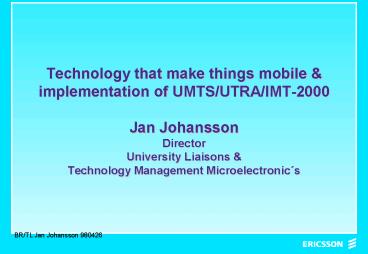Technology that make things mobile - PowerPoint PPT Presentation
1 / 21
Title:
Technology that make things mobile
Description:
Video. High. Quality. BR/TL Jan Johansson 980426. Mobile Telephone/Internet users. 1995 ... mature. technology. Shortest possible. time to market. Maximum ... – PowerPoint PPT presentation
Number of Views:28
Avg rating:3.0/5.0
Title: Technology that make things mobile
1
Technology that make things mobile
implementation of UMTS/UTRA/IMT-2000Jan
JohanssonDirectorUniversity Liaisons
Technology Management Microelectronics
BR/TL Jan Johansson 980426
2
Terminology
- UMTS Universal Mobile Telecommunication
Systems - UTRA UMTS Terrestrial Radio Access
- IMT-2000 International Mobile
Telecommunication Systems
BR/TL Jan Johansson 980426
3
What is UMTS/IMT-2000?
1st generation
2nd generation
3rd generation
Multimedia services (lt2 Mbps) 2nd gen. services
Analogue speech
Digital speech low-rate data (lt64 kbps)
NMT, AMPS, TACS
GSM, PDC, IS-95,IS-136 (D-AMPS)
UMTS/IMT-2000
1990
2000
1980
4
TDMA
Meetings
Ampl.
Time
.
Time slots
.
.
.
Freq.
f1
f2
f3
980502 BR/TL Jan Johansson
5
CDMA
Cocktail Party
Ampl
Code
Noise
Band
Freq.
980502 BR/TL Jan Johansson
6
IMT 2000 User Data Rates
Bits/sec
Video
1 M 100 k 10 k 1k
Internet Access
High Quality
Graphics
Medium Quality
Text
Voice
BR/TL Jan Johansson 980426
7
Mobile Telephone/Internet users
Millions
600
500
Mobile telephone users
400
300
200
Internet users
100
0
1995
1996
1997
1998
1999
2000
2001
1994
1993
8
Technology choice key considerations
Lowest possible infrastructure cost
Lowest possible complexity ofequipment
Lowest possible implementation cost
Best coverage and capacity
Technology for high bit rates
Shortest possibletime to market
Superior spectrum efficiency
Low-risk,mature technology
Lowest possible transmission cost
Maximum service flexibility
Global acceptance of standard
9
Key Market Drivers and Building a Successful
Operator Business - GSMWCDMA
- Internet access for Mobile Multimedia
- Making the 3rd generation Personal Multimedia
market a success - Cost and Timing battles - Preserving the investments - evolution from GSM
- New generation of technology - higher efficiency
and capability - Personal Multimedia/Mobile Internet access
require high quality networks with low
infrastructure and terminal cost
10
Implementation Technologies
- Antennas
- RF
- ADC
- Dig IF Logic
- DSP
- CTRL
- PA/MCPA
- SW .
- Competence in all these areas is a necessity
BR/TL Jan Johansson 980426
11
SYSTEM On a CHIP
SYSTEM
SW
Alg.
FUNCTIONAL PARTITIONING
Behavioral System View
ANALOG SUB SYSTEM
DIG.SUB SYSTEM
FUNCTIONAL ARCHITECTURE
Analog
DSP
CTRL
FUNCTIONAL ARCHITECTURE TO HW/SW MAPPING
RF
CTRL SW
DSP SW
DIG HW
MAD
HW/SW Comp. View
ASIC
ASIC
ASIC
BIN
BIN
HW/SW INTEGRATION BOARD and COMPONENT LEVEL
Actual Syst.
TARGET SYSTEM
970914 BR/TL Jan Johansson
12
SYSTEM INTO SILICON
- Profile of Competence
Mathematics System Protocol Algorithm Architecture
CIRCUIT DESIGN Components Material
Dig
RF
A/D D/A
Total view is important
BR/TL Jan Johansson 980426
13
DSP Implementation Alternatives
ASIC
STD DSP CoreLogic
STD DSP
FLEX ASIC
Flexibility
Perf. Speed
Area/Cost
Vendor Independence
SW dev. Effort
HW Design Effort
970903 BR/TL Jan Johansson
14
Flex ASIC (Flexible DSP ASICs)
- Processing power Vs Silicon area
- Power reduction
STD DSP 1 X
ASIC 20 X
Flex ASIC 10 X
971130 BR/TL Jan Johansson
15
Flex ASIC Chip Architecture
. . . . . . .
971130 BR/TL Jan Johansson
16
Flex ASIC SW Development Tools
- Assembler
- Link Editor
- Debugger
- Linkable simulator
- C compiler
971130 BR/TL Jan Johansson
17
Flex ASIC HW Dev. Tools Methodology
RTL lev. VHDL
Synthe- sise
STD ASIC Flow
Sim P R
971130 BR/TL Jan Johansson
18
Flex ASIC Issues
- Why own DSP cores?
- Vendor independence
- Own IP
- Use of STD ASIC flow
- Easy to move to another process
- Enables common mem. concept
- Configurable to particular application
- Possible to include dedicated HW and instructions
- Allow parallel execution of instructions
- Emulator support
971130 BR/TL Jan Johansson
19
Silicon chips without SW will be useless in the
future
Hardware spec
Software spec
20
SYSTEM INTO SILICON Memory versus Logic
Logic chip with mem.
Mem. chip with logic
BR/TL Jan Johansson 980426
21
System Design Productivity Triangle
20 gt 80
Goal gt
80 gt 20
BR/TL Jan Johansson 980426
22
Summary Implementation Technology
- Relevant connection from highest system level
down to component and material level. - SOC HW without SW will be useless in the future.
- Low power means power minimization for both SW
HW - Manage future complexity
- More innovations on application specific
Architectures for mem. access and data-path - Manage future complexity
- Future systems will include electrons and
Photons(mixed)
23
Summary
GSM and WCDMA to Third-generation
Market-drivenIntroduction ofthird-generationmul
timedia servicesbased onmass marketcost-of-serv
ice (WCDMA)
Enhanced datarates over GSMup to 384 kbps (EDGE)
Support forInternet/intranetservices (GPRS)
Support forhigh-speedcircuit-switcheddata over
GSM
WorldwideGSM massmarket
1999
2000
1998
1997
2001/2002

